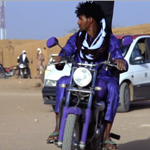 (Akounak tedalat taha tazoughai)
(Akounak tedalat taha tazoughai)
I heard about this a couple years ago as “the Nigerian Nigerien remake of PURPLE RAIN.” And that’s a fairly accurate description, so obviously I had to see it eventually.
This is the first film made in a Tuareg language – Nigeriens mostly watch movies in Hausa – and apparently they don’t have a word for purple, hence the poetically clunky title. I’m sure they also have NOON THE COLOR OF BLUE WITH A LITTLE RED IN IT and THE COLOR THE COLOR OF BLUE WITH A LITTLE RED IN IT.
Guitarist Mdou Moctar stars as himself, a nomadic musician who arrives in the city of Agadez, Niger and starts up a rivalry with the local musicians. Like PURPLE RAIN, the movie aims to hype up an interesting musical scene, but the Sahara is pretty different from Minneapolis. There does seem to be some night life, but not really a club like the 1st Ave. Mostly these guys are competing for wedding gigs, and their songs become popular when people trade them on SIM cards for their cell phones. They keep handing each other phones to listen to songs on. A sort of in-person file-sharing system.
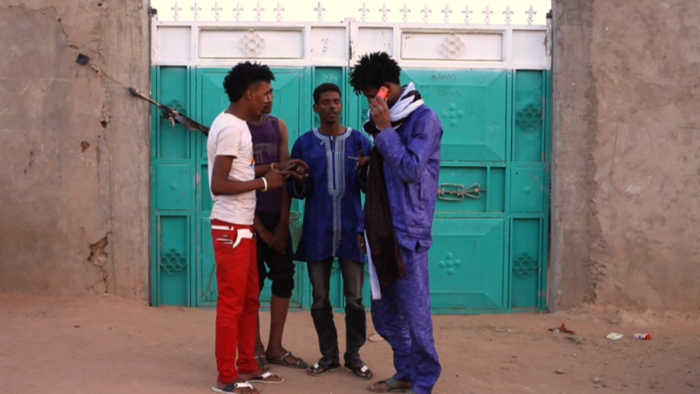
It’s not a scene-for-scene remake, but it does very loosely follow the story. Instead of a local who the club owner thinks is out of touch, Mdou is new to the city and impressing everyone with his guitar skills. Kader (Kader Tanoutanoute) is the Morris Day equivalent, the jealous rival, and though his character is very different he actually kind of resembles Morris Day. He insults Mdou by trying to get him to be his rhythm guitarist when he only wants to play his own songs. They still shake hands though.
Instead of being a dainty little Prince, Mdou towers over everyone, but he does have a rock star charisma and swagger. He usually wears purple and drives a purple motorcycle, and he meets a girl named Rhaicha (Rhaicha Ibrahim) who he buys a necklace for and drives out not to the lake but to the desert. (She does not jump in naked.)
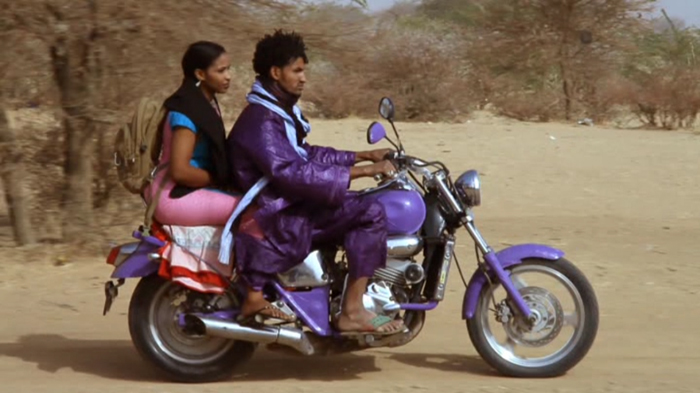
Like The Kid he still lives with his parents and has a contentious relationship with them. Mom and dad don’t fight, but dad disapproves of his career – in this case because of religion, and a secret past as a songwriter when all of his friends turned into druggies and bandits. Actually this kind of mirrors Prince himself. Moctar also sings about his religion in his popular music. I don’t know if he’s doing sexy Islam songs though.
If there’s a Wendy & Lisa in this it’s two dudes. Just like The Revolution, Mdou’s band have written a song they want him to play, and he’s too self-absorbed to even listen to it. At the end there’s a formal battle of the bands against Kader, who (in more of a BRING IT ON or Emett Otter’s Jug Band Christmas move than PURPLE RAIN) heads him off by stealing the song he plans to play. By this point he’s alienated his girlfriend in an ego-driven (thankfully not abusive) argument, but she comes back in time to see him play his great new song synthesized from his dad’s old lyrics and his band’s music.
They also have little bits like Kader insulting him backstage Morris-style, and Mdou running backstage after his performance, overwhelmed with emotion. To their great credit, they mimic the image and font of the original’s title shot:
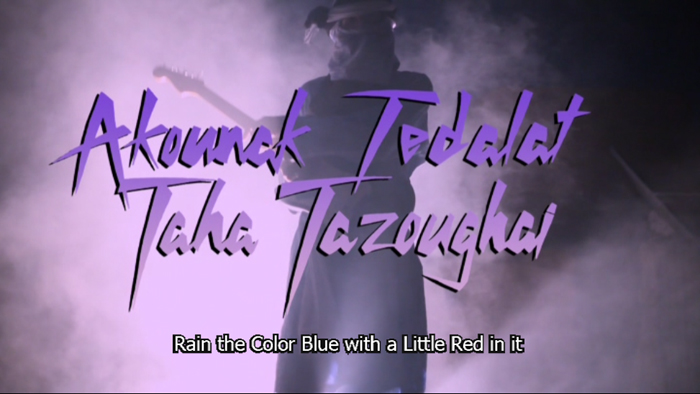
and (with a little less accuracy) the goofy final freeze frame.
And there’s a guy running the contest who’s shown enjoying the music while wearing sunglasses. Mdou’s dad doesn’t shoot himself like The Kid’s dad, so he’s also there to watch and be shown being proud of his son.
It’s no PURPLE RAIN, of course, but it’s so interesting to see elements of this familiar American tale transposed to a region and culture that I have zero knowledge of. They own guitars, motorcycles and phones, and not much else. They play weddings for money, get together and drink tea and play songs. Mdou is handsome, but often covers his face in scarves like the desert wanderer he is. He talks about this being a big city, but there are no tall buildings or paved roads. When Mdou comes home and finds his father burning his guitar, he doesn’t flip out. He just keeps telling him “It’s not normal for you to burn my guitar” and then walks away.
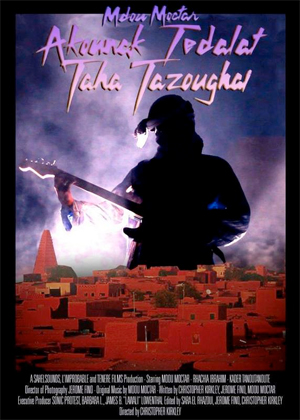 The Atlantic had a good article about the movie. The story behind it is very interesting, but in some ways disappointing. It turns out that this is not the product of some West African musicians being obsessed with Prince and wanting to make their own version of his movies. The director, Christopher Kirkley, is an ethno-musicologist from Portland who became aware of Sahel music and started the label Sahel Sounds to release the compilation Music from Saharan Cellphones Volume 1. Then he wanted to make a musician vehicle like PURPLE RAIN or THE HARDER THEY COME to bring attention to this scene. When he met Moctar he knew that was the guy to star in it.
The Atlantic had a good article about the movie. The story behind it is very interesting, but in some ways disappointing. It turns out that this is not the product of some West African musicians being obsessed with Prince and wanting to make their own version of his movies. The director, Christopher Kirkley, is an ethno-musicologist from Portland who became aware of Sahel music and started the label Sahel Sounds to release the compilation Music from Saharan Cellphones Volume 1. Then he wanted to make a musician vehicle like PURPLE RAIN or THE HARDER THEY COME to bring attention to this scene. When he met Moctar he knew that was the guy to star in it.
If you got a laugh out of the title you’re actually laughing with them, because it was kind of a joke working title that they stuck with because the people in the area were very invested in the making of the movie and knew it by that title. And it was apparently scripted a little closer to PURPLE RAIN, but the stars changed it to fit their real lives more. For example, Moctar has to deal with only knowing how to play left-handed.
What I have not found in any articles is whether these musicians were very familiar with Prince and PURPLE RAIN or whether that was just foisted on them by the director. Either way, it’s still a film that bridges cultures beautifully. We see this society and landscape so drastically different from ours, but it’s not just a National Geographic article. We’re brought in by some dudes who are just dudes, you know? It’s a youth subculture, people rebelling a little and expressing themselves, drawing from the musical traditions of their ancestors but also Jimi Hendrix and modern autotune music and the other people they hang out with. It’s kind of beautiful.
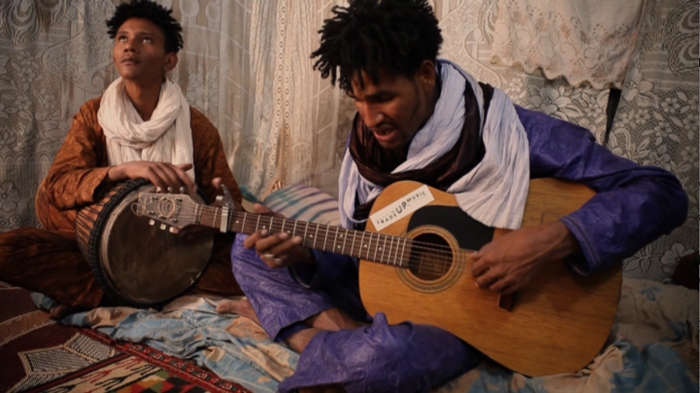
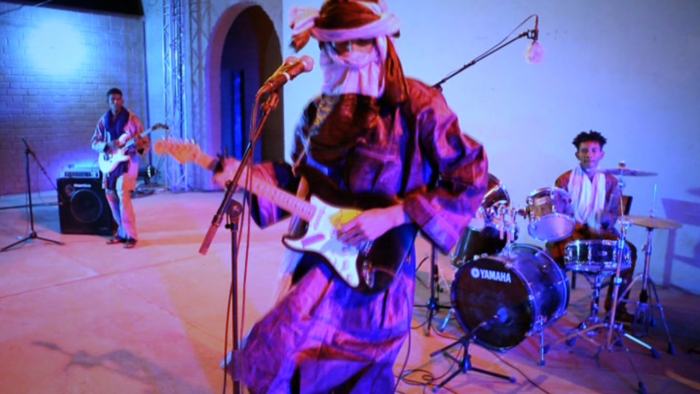
I’ve been working on this review for a bit and I just noticed that Moctar is on tour in the U.S. right now. I thought I should get this up quick because he’s playing Amoeba Records tomorrow, September 7th, and then going around the country (but not here). He’s even playing in Minneapolis, but not at the 1st Ave. Anyway, I’d check him out if I could. Tour dates on his label’s websight.
It says they’re hoping to film “a sequel of sorts” as the band tours America, so that’s exciting. Nigerien GRAFFITI BRIDGE.



























September 6th, 2017 at 2:35 am
I hate to quibble Vern, when this is so clearly a gem and your review is great, but I think the adjective you want here is Nigerien, not Nigerian. This is a movie from Niger, which has a large Tuareg population, not Nigeria, which doesn’t. Niger is twice the size of California, even if much of that is the Sahara.